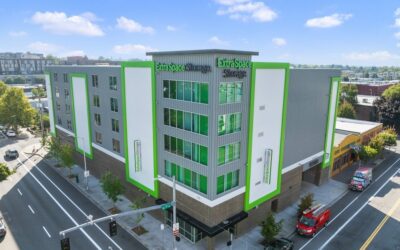Continued overbuilding across the country is putting price pressures on self-storage facilities across most of the country – and nowhere are the price pressures greater than in Pittsburgh, Minnesota’s Twin Cities and South Carolina’s Charleston, according to a new Yardi Matrix report.
For the entire country, rent prices fell by about 1 percent in January, year over year, for non-climate controlled units and by 2.3 percent for climate-controlled units, according to data.
The only major U.S. markets to see significant price growth in January were Los Angeles and Las Vegas, with increases ranging from about 1 percent to 4 percent, depending on whether properties had non-climate or climate-controlled units, according to Yardi Matrix.
As for all other major markets? It was largely down in January, except for a handful of metro areas that saw slight bumps in their non-climate-controlled prices.
The reason for the continuing declines?
Generally, overbuilding is the main culprit, according to Yardi. The surge in new and planned construction has reached a crescendo with the firm tracking 2,189 new facilities, up 0.2 percent in January 2020 compared to January 2019, according to the Yardi report. The share of self-storage projects in various stages of development accounts for 9.1 percent of the total U.S. stock tracked by Yardi.
A sliver of good news
But Jeff Adler, vice president at Yardi Matrix, says it’s “not all doom and gloom” when it comes to new construction and prices. First, the pace of rate declines is slowly decelerating, and, second, markets are generally showing the ability to adjust to occasional spikes in supplies.
“The markets are flexible,” Adler said in a recent interview, before all the recent coronavirus and accompanying economic concerns emerged. “The markets are assessing all that’s happening and they’re adjusting.”
Of course, regional lockdowns and social-distancing behavior could have a big unforeseen impact on rates going forward.
Hardest hit markets
But then there’s Pittsburgh, Minnesota’s Twin Cities and South Carolina’s Charleston – where year-over-year prices have fallen from 7 to 8 percent, according to data.
All three markets have different characteristics and quirks, but their recent price plunges ultimately come down to one thing: Overbuilding.
Minneapolis-St. Paul
In Minnesota’s Minneapolis and St. Paul markets, Chris Kirwan, president of Acorn Mini Storage in the Twin Cities, says “dozens and dozens” of new facilities have been built in recent years, increasing the overall supply by about 15 to 20 percent, and it’s “really starting to catch up to everyone.”
“It’s all around the area,” he said of new self-storage facilities. “It’s an over-supply situation, definitely.”
Tom Flannigan, a broker at Keller Williams and at Argus Self Storage Advisors, said he recently did a valuation for one self-storage property in the Twin Cities area – and found its value had fallen by more than $1 million compared to a few years earlier, thanks to falling rents and the spiking number of new facilities in the region.
There’s “tons of new supply” in the Twin Cities area, particularly along Highway 280 separating Minneapolis and St. Paul, he said. Real estate investment trusts and other larger players are aggressively tapping into the market, among them Public Storage, which Flannigan said is currently building a new 200,000-square-foot facility in the area.
Charleston
In Charleston, SC, the story is roughly the same: Oversupply.
A “combination of everyone” seems to be building new facilities in South Carolina, but companies affiliated with large REITs are especially aggressive on the construction front, says Mike MacManus, first vice president of investments at Marcus & Millchap, a commercial real estate investment broker. Charleston and Greenville are “hotbeds” of new construction, he said.
“There’s a touch of blind optimism in some markets,” MacManus said of construction in both in North and South Carolina. MacManus sits on the boards of both states’ self-storage associations.
Charleston’s historic downtown district isn’t seeing much activity, largely because of its protected status and lack of space. Instead, most new construction and conversions are occurring north of the downtown area, MacManus aid.
Pittsburgh
In Pittsburgh, which saw the steepest price declines of any city in the U.S. in January, it’s all, once again, about new supply.
Steve Mitnick, president of STORExpress, said self-storage facilities in the Pittsburgh area traditionally have been “slow to rent out,” due to the region’s stock of older homes with big basements and attics that are used for storage. In addition, Pittsburgh generally isn’t considered a very transient city with a high demand for storage, he said.
So when new self-storage facilities are built, he says, it just puts added pressure on existing operators. “Anytime you have a new competitor, you feel like (the area) is overbuilt,” he said.
As it is, STORExperess is building a new 100,000-square-foot facility in the city and converting an old manufacturing plant in nearby Fayette County into a 300,000-square-foot self-storage facility.
But Mitnick said his decision to build came after careful research of “micro-markets,’ or submarkets, in the area – and he feels confident his two new facilities are needed and will succeed.
STORExpress, which currently owns 12 facilities, is a “specialty storage” company providing large contractor units used by businesses and even artists for studios, he said. STORExpress also offers some indoor vehicle parking.
David Whitney, owner of Pittsburgh Self Storage, said he’s not seeing price declines at his three facilities, probably because he’s a “mom-and-pop” operator with non-climate-controlled units and with product offerings, such as boat and car storage, not provided by many competitors.
But that doesn’t mean he isn’t seeing new storage properties popping up all around the Pittsburgh area.
“As I drive around, I see more and more of them,” he says of new facilities, adding he’s constantly getting cold calls from investors wanting to buy his properties.







